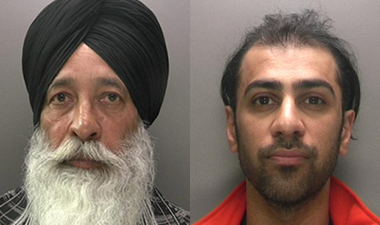Singer Foji Gill & Father Jailed for money laundering worth over £35m

Sixteen members of a Midlands-based money laundering network have been jailed for over 73 years for their roles in laundering more than £35 million through UK banks and money service businesses.
The National Crime Agency is releasing details of the three-year investigation as the final four members of the network were sentenced at Birmingham Crown Court yesterday.
Head of the network, Harpal Singh Gill, aged 67, from Smethwick (Father of singer Foji Gill), who was previously a textile trader, initiated and orchestrated the entire operation. Crime groups across the country used the services on offer to launder their drugs money. Gill set up a number of bogus clothing and textilecompanies to provide a mechanism for the apparent purchase of goods from companies, but no actual purchases or trade ever occurred. False invoices helped his network launder over £35 million between May 2007 and May 2013.
He recruited his son, Manjit Gill, aged 40, from Edgbaston, a singer who is also known as Foji Gill, to take on the role of director for a number of companies. He also had responsibility for receiving significant amounts of money. Gill and his son were sentenced for money laundering offences in March this year at Birmingham Crown Court, receiving 11 years and five years respectively.
His Honour Judge Bond stated at the time that Gill “took a leading role in a sophisticated money laundering arrangement” that required “significant planning” over a sustained period of time. He added that he was sure his son “knew what he was doing was criminal” and that £8,000 found concealed in his bedframe had to have been part of a reward for his criminal activity.
The last four members of the network sentenced late yesterday were James Coulson, aged 28, from Liverpool (27 months); Santokh Singh Sangha, aged 62, from Leicester (3 years); Andrew Wilson, aged 60, from Bedworth (nine months suspended); and Sarup Singh Parmar, aged 65, from Sparkhill (29 months).
Paul Risby, NCA Branch Commander at the National Crime Agency said:
“Harpal Singh Gill used his position as head of his family and local businessman to influence family members and associates in his local community to be part of his criminal enterprise. He knowingly took advantage of the respect afforded to him, persuading them to set up bogus companies and handle huge amounts of cash on his behalf.
“Those involved in the most serious types of crime depend entirely on the service provided by money launderers like Gill and his associates to hide their criminal money. Gill’s network was responsible for laundering over £35 million, every single pound of which represents misery inflicted on communities locally and across the UK.
“Gill’s lengthy prison sentence should act as a deterrent to others who think they can launder money and get away with it. This investigation has also shown that misguided loyalty also results in prison time. Anyone considering assisting those involved in this type of crime should clearly think again.”

Gill employed his friend and accountant, Gurpreet Singh Roewal, aged 50, from Solihull, who was his right hand man and received eight years in March 2015. He advised Gill how to stay under the radar of HM Revenue and Customs & UK Law Enforcement. They adapted their business model to ensure they would appear to meet the minimum standards required under UK money laundering regulations.
Roewal provided an air of legitimacy to the bogus companies by opening bank and trading accounts, and liaised with MSBs to arrange exchange rates and the transfer of cash. When financial institutions raised concerns about any of the companies and money being paid in compared to the lack of trade, he would close them down and set up new ones.
Among the other members of the network jailed was mother-of-two Smita Gareja, aged 48, from Birmingham, who was previously of good character. She was the only female to be convicted for and received 27 months. Gareja willingly provided her identity as cover, never questioning the need to use her name as director for a fake business account. She turned a blind eye to the fraudulent nature of the set up wrongly believing that not engaging in the day to day transfer of money would protect her from prosecution.
Source: nationalcrimeagency.gov.uk

 Follow
Follow comments feed
comments feed









